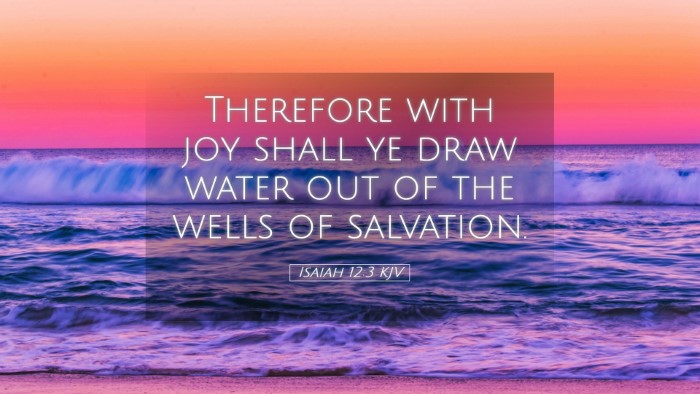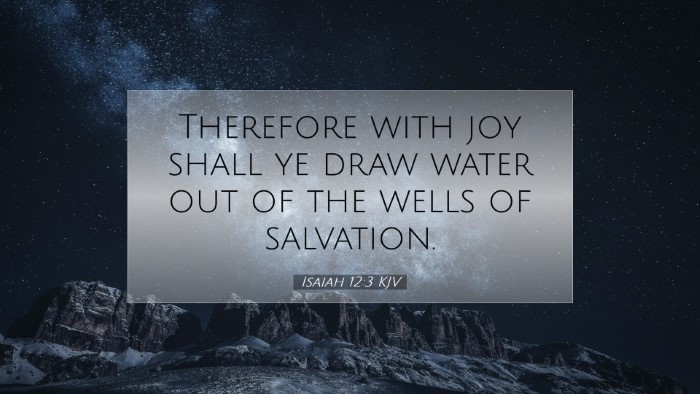Commentary on Isaiah 12:3
Isaiah 12:3 (KJV): "Therefore with joy shall ye draw water out of the wells of salvation."
Introduction
The twelfth chapter of Isaiah marks a significant shift in the narrative from the prophecies of judgment to those of hope and salvation. Isaiah 12:3 encapsulates a profound truth about the joy associated with salvation. It serves as a reminder of the richness of God's grace and the abundant life found in Him.
Contextual Overview
To understand Isaiah 12:3, it is essential to consider its context within the chapter and the larger book of Isaiah. In chapters 1-11, Isaiah primarily delivers messages of judgment against Israel and the nations. However, beginning in chapter 12, we encounter a song of praise, celebrating the deliverance that God provides.
Historical Background
This verse is part of a prophetic song that anticipates the coming of the Messiah and the establishment of God's kingdom. The historical backdrop includes the exile of Israel and the promise of restoration. This context deepens the meaning of ‘drawing water from the wells of salvation’ as it encapsulates the hope of rescue and the joy of restoration.
Exegesis of the Verse
The phrase “with joy” emphasizes the emotional response that should accompany the act of drawing from the wells of salvation. Joy here is not only an emotion but a profound realization of God’s saving work.
The Metaphor of Water
Water is a potent symbol throughout Scripture, often reflecting life, sustenance, and purification. In Isaiah 55:1, the metaphor of water is similarly used to illustrate an invitation to salvation: “Ho, everyone that thirsteth, come ye to the waters.” The wells of salvation signify the abundant resources available to believers through their relationship with God.
The Wells of Salvation
Commentators like Matthew Henry suggest that the "wells" are metaphorical for the many blessings and graces that flow from God. Salvation is not a one-time event but a continual source of life and joy that believers can draw from. Albert Barnes adds that these wells represent the deep, inexhaustible richness of God’s redemption, providing spiritual nourishment and strength.
Pastoral Applications
For pastors and spiritual leaders, Isaiah 12:3 serves as an encouragement to convey to their congregations the importance of accessing the joy of salvation in their daily lives. This joy can lead to a transformed community, where individuals acknowledge the gravity of their sin while celebrating the grace and forgiveness found in Christ.
Building a Joyful Community
- Encouragement: Pastors should encourage believers to draw from the ‘wells’ through prayer, worship, and Scripture study.
- Discipleship: Implementing discipleship programs that remind followers of the joy of their salvation and how that joy can be shared with others.
- Evangelism: The joy of salvation serves as a compelling testimony to a world desperate for hope.
Theological Reflections
Theologically, this verse affirms the reformed understanding of salvation, which emphasizes that it is a gift from God and a source of deep joy. Adam Clarke emphasizes the necessity of joy in the believer’s life, suggesting that it should spring from both an understanding of one’s salvation and an acknowledgment of God’s unfailing love.
Spiritual Growth
As believers draw from the wells of salvation, they are not only filled with joy but also grow spiritually. This growth is reflective of the ongoing sanctification process, where believers become more aligned with God's will. Drawing from these wells regularly leads to spiritual maturity and deeper intimacy with God.
Conclusion
Isaiah 12:3 beautifully expresses the joy that accompanies salvation, urging believers to actively partake in this divine provision. By understanding the depths of this joy and the resources available through God, believers are equipped to face life's challenges and share this hope with others.
In conclusion, Isaiah 12:3 invites us to rejoice and actively engage in deepening our understanding of salvation, finding strength and joy in the wellsprings of God's grace.


